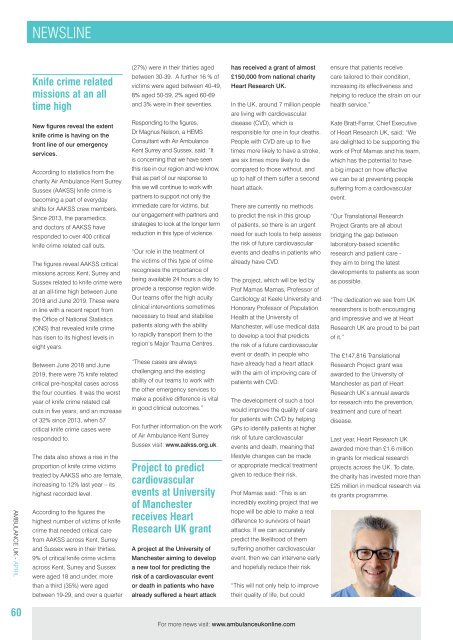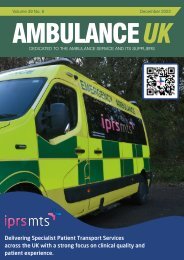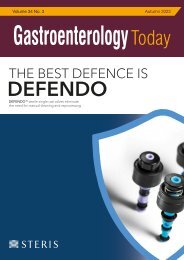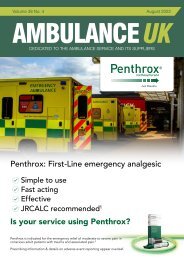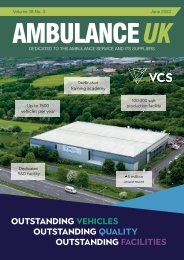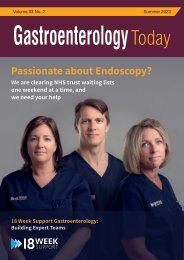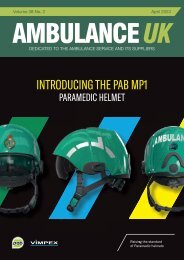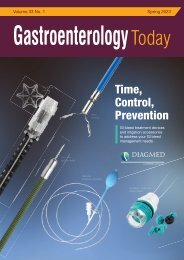Ambulance UK - April 2020
Create successful ePaper yourself
Turn your PDF publications into a flip-book with our unique Google optimized e-Paper software.
NEWSLINE<br />
AMBULANCE <strong>UK</strong> - APRIL<br />
Knife crime related<br />
missions at an all<br />
time high<br />
New figures reveal the extent<br />
knife crime is having on the<br />
front line of our emergency<br />
services.<br />
According to statistics from the<br />
charity Air <strong>Ambulance</strong> Kent Surrey<br />
Sussex (AAKSS) knife crime is<br />
becoming a part of everyday<br />
shifts for AAKSS crew members.<br />
Since 2013, the paramedics<br />
and doctors of AAKSS have<br />
responded to over 400 critical<br />
knife crime related call outs.<br />
The figures reveal AAKSS critical<br />
missions across Kent, Surrey and<br />
Sussex related to knife crime were<br />
at an all-time high between June<br />
2018 and June 2019. These were<br />
in line with a recent report from<br />
the Office of National Statistics<br />
(ONS) that revealed knife crime<br />
has risen to its highest levels in<br />
eight years.<br />
Between June 2018 and June<br />
2019, there were 75 knife related<br />
critical pre-hospital cases across<br />
the four counties. It was the worst<br />
year of knife crime related call<br />
outs in five years; and an increase<br />
of 32% since 2013, when 57<br />
critical knife crime cases were<br />
responded to.<br />
The data also shows a rise in the<br />
proportion of knife crime victims<br />
treated by AAKSS who are female,<br />
increasing to 12% last year – its<br />
highest recorded level.<br />
According to the figures the<br />
highest number of victims of knife<br />
crime that needed critical care<br />
from AAKSS across Kent, Surrey<br />
and Sussex were in their thirties.<br />
9% of critical knife crime victims<br />
across Kent, Surrey and Sussex<br />
were aged 18 and under, more<br />
than a third (35%) were aged<br />
between 19-29, and over a quarter<br />
(27%) were in their thirties aged<br />
between 30-39. A further 16 % of<br />
victims were aged between 40-49,<br />
8% aged 50-59, 2% aged 60-69<br />
and 3% were in their seventies.<br />
Responding to the figures,<br />
Dr Magnus Nelson, a HEMS<br />
Consultant with Air <strong>Ambulance</strong><br />
Kent Surrey and Sussex, said: “It<br />
is concerning that we have seen<br />
this rise in our region and we know,<br />
that as part of our response to<br />
this we will continue to work with<br />
partners to support not only the<br />
immediate care for victims, but<br />
our engagement with partners and<br />
strategies to look at the longer term<br />
reduction in this type of violence.<br />
“Our role in the treatment of<br />
the victims of this type of crime<br />
recognises the importance of<br />
being available 24 hours a day to<br />
provide a response region wide.<br />
Our teams offer the high acuity<br />
clinical interventions sometimes<br />
necessary to treat and stabilise<br />
patients along with the ability<br />
to rapidly transport them to the<br />
region’s Major Trauma Centres.<br />
“These cases are always<br />
challenging and the existing<br />
ability of our teams to work with<br />
the other emergency services to<br />
make a positive difference is vital<br />
in good clinical outcomes.”<br />
For further information on the work<br />
of Air <strong>Ambulance</strong> Kent Surrey<br />
Sussex visit: www.aakss.org.uk.<br />
Project to predict<br />
cardiovascular<br />
events at University<br />
of Manchester<br />
receives Heart<br />
Research <strong>UK</strong> grant<br />
A project at the University of<br />
Manchester aiming to develop<br />
a new tool for predicting the<br />
risk of a cardiovascular event<br />
or death in patients who have<br />
already suffered a heart attack<br />
has received a grant of almost<br />
£150,000 from national charity<br />
Heart Research <strong>UK</strong>.<br />
In the <strong>UK</strong>, around 7 million people<br />
are living with cardiovascular<br />
disease (CVD), which is<br />
responsible for one in four deaths.<br />
People with CVD are up to five<br />
times more likely to have a stroke,<br />
are six times more likely to die<br />
compared to those without, and<br />
up to half of them suffer a second<br />
heart attack.<br />
There are currently no methods<br />
to predict the risk in this group<br />
of patients, so there is an urgent<br />
need for such tools to help assess<br />
the risk of future cardiovascular<br />
events and deaths in patients who<br />
already have CVD.<br />
The project, which will be led by<br />
Prof Mamas Mamas, Professor of<br />
Cardiology at Keele University and<br />
Honorary Professor of Population<br />
Health at the University of<br />
Manchester, will use medical data<br />
to develop a tool that predicts<br />
the risk of a future cardiovascular<br />
event or death, in people who<br />
have already had a heart attack<br />
with the aim of improving care of<br />
patients with CVD.<br />
The development of such a tool<br />
would improve the quality of care<br />
for patients with CVD by helping<br />
GPs to identify patients at higher<br />
risk of future cardiovascular<br />
events and death, meaning that<br />
lifestyle changes can be made<br />
or appropriate medical treatment<br />
given to reduce their risk.<br />
Prof Mamas said: “This is an<br />
incredibly exciting project that we<br />
hope will be able to make a real<br />
difference to survivors of heart<br />
attacks. If we can accurately<br />
predict the likelihood of them<br />
suffering another cardiovascular<br />
event, then we can intervene early<br />
and hopefully reduce their risk.<br />
“This will not only help to improve<br />
their quality of life, but could<br />
ensure that patients receive<br />
care tailored to their condition,<br />
increasing its effectiveness and<br />
helping to reduce the strain on our<br />
health service.”<br />
Kate Bratt-Farrar, Chief Executive<br />
of Heart Research <strong>UK</strong>, said: “We<br />
are delighted to be supporting the<br />
work of Prof Mamas and his team,<br />
which has the potential to have<br />
a big impact on how effective<br />
we can be at preventing people<br />
suffering from a cardiovascular<br />
event.<br />
“Our Translational Research<br />
Project Grants are all about<br />
bridging the gap between<br />
laboratory-based scientific<br />
research and patient care -<br />
they aim to bring the latest<br />
developments to patients as soon<br />
as possible.<br />
“The dedication we see from <strong>UK</strong><br />
researchers is both encouraging<br />
and impressive and we at Heart<br />
Research <strong>UK</strong> are proud to be part<br />
of it.”<br />
The £147,816 Translational<br />
Research Project grant was<br />
awarded to the University of<br />
Manchester as part of Heart<br />
Research <strong>UK</strong>’s annual awards<br />
for research into the prevention,<br />
treatment and cure of heart<br />
disease.<br />
Last year, Heart Research <strong>UK</strong><br />
awarded more than £1.6 million<br />
in grants for medical research<br />
projects across the <strong>UK</strong>. To date,<br />
the charity has invested more than<br />
£25 million in medical research via<br />
its grants programme.<br />
60<br />
For more news visit: www.ambulanceukonline.com


